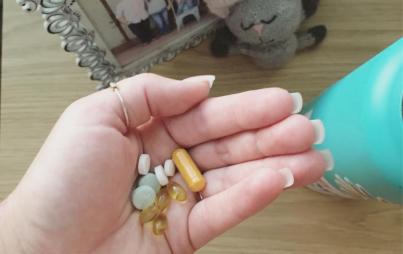
I don’t want this disease. Or these medications. I don’t want to be tired, but I am. I don’t want to fall asleep with my face in the carpet, but I do.
The carpet in our house is an “upgrade” from the standard new house installation. I’m face down in it. My two youngest children are asleep in their shared bed to my left. My phone is next to me, the screen black. I remember I had been reading To Kill A Mockingbird.
I wish the “upgraded” carpet had been upgraded to something softer. I am marked with the impression of low-pile polyester, my body jerked awake by a dream of falling. The carpet is itchy. My husband is gone. My teenagers are gone. The littlest children are asleep. I don’t know what time it is.
Thirty minutes. Can you not just keep your eyes open for 30 minutes?
I’m paralyzed by how much I have to do. The downstairs is a wreck — toys scattered on the floor, wet bathing suits and towels draped over chairs, dishes from dinner piled and unwashed. I haven’t vacuumed in three days. There are four loads of laundry to be folded. I’m panicking. All of this to do and I fell asleep.
The to-do list rolls through my cloudy head on fast-forward. My pulse quickens. I sweat. I cry. I quickly calculate how much sleep I can get; how much I “need” before the children inevitably wake at 6 a.m. It’s 11. Seven hours. If I go to sleep now, here, fully dressed, on the upgraded carpet, I can get seven hours.
I’m supposed to get at least seven hours. I know this because my psychiatrist told me. He tells me every month when I visit him. I sit in his office, watch him eat Sun Chips and drink a Starbucks latte, and he prods: Are you sleeping enough? How much? Are you waking? How often? How long does it take for you to get back to sleep? Can you? Are you keeping your sleep journal? How is your “sleep hygiene”?
"Sleep hygiene" is the term professionals use to evaluate your pre-sleep routine, to make sure you aren’t drinking too much coffee or watching too much TV. To make sure you are exercising, but not before bed, to make sure you are winding your body down in preparation for sleep. Anything too stimulating is considered poor “sleep hygiene,” and if I were honest about my pre-sleep behavior — frantic cleaning, writing, vacuuming, email-sending — he’d frown and chastise me. He'd suggest Ambien to "help" me sleep.
I don’t want Ambien. I don’t need Ambien.
I don’t want seven hours. I don’t need seven hours.
I don’t want to sleep at all. Sleep is lost time. If I tell him this he’ll give me Ambien. So I don’t.
♦ ♦ ♦ ♦ ♦ ♦ ♦ ♦ ♦ ♦ ♦ ♦ ♦ ♦ ♦ ♦ ♦ ♦ ♦ ♦ ♦ ♦ ♦ ♦
The medications that manage my bipolar disorder exhaust me. I’m always tired. To me, there is nothing worse than tired. This is a feature of the mania part of being bipolar. Sleep is wasted time. This is time I could be doing other things: Writing, reading, cleaning, sewing, gardening, working, scrubbing things with a toothbrush, organizing my closet at 2 a.m. I know I need sleep; everyone is always telling me so. I just don’t want it. I hate these meds for making me want it.
I hate these meds and all of their side effects. The heavy feeling of exhaustion. The memory loss. The dry mouth. The embarrassment of my inability to find the correct words in conversation. The struggle I have, even now, writing this, to compose the sentences I want. The constant reading and re-reading. The anger. The self-loathing.
I don’t want this disease. Or these medications. I don’t want to be tired, but I am. I don’t want to fall asleep with my face in the carpet, but I do.
My medication is part of my nighttime routine: I wash my face, apply moisturizer, scrub my hands pink with sugar scrub, and lotion them with shea butter. I pause to look at my reflection, note the wrinkles, the bags under my eyes, to see if I recognize the woman looking back. I comb my hair, wrap it in a bun, and then open my little blue pill organizer. W. It's Wednesday.
Four pills. So small. White. Yellow. Oval. Round. Scored for cutting. Numbered. What the numbers indicate, I don’t know. Something important to the pharmaceutical company, I suppose.
I pour them into my hand and I pause. I consider dropping them into the sink, taking them into the bathroom to flush, or throwing them across the room.
Four pills. They keep me sane. They keep me grounded. They make me tired. They make me mad. They are the thing I should thank for my mental wellness. They are the thing standing between me and maximum productivity.
At any given time, 50% of bipolar patients aren’t taking their medications with regularity.* I’m in the “other half,” I guess. The compliant half — which makes me a success, by psychiatric standards.
I don’t feel like a success.
I don’t like these meds. I don’t like how they blunt me, slow me, numb me. Even the best balance of medications is still medication. And I want to dump them. Throw them. Crush them.
"I don’t need them", I think. I’m cured.
The meds lie. But it seems so real, the sanity. The lull of life — and the boredom of it — makes it seem like I must be normal. This must be what normal feels like. And I don’t need pharmacology to keep me normal.
I’m better. I’m cured.
This is the voice of the 50%. The 50% who feel normal enough to not want to feel medicated, blunted, stunted, and impaired by the pills that keep them sane. The 50% who think, “I’ll just flush these pills. I’m cured.”
If you have diabetes, you need insulin or you’ll die. But if you have a psychiatric disorder, you may not go off the deep end right away. This only adds to the illusion of a cure. So those 50% just might look normal for a while.
I’ll just flush these pills.
If mania comes before depression, you might not know it, but you will love it. Mania is a trusted friend. Mania gets the house clean. Mania is creative. Mania makes you superior — look at all you can accomplish. It drives. It pushes. It inspires. But then, before you know it’s mania, you’re spending all your money, cheating, lying, walking out on your kids. Acting a fool. Yet it all seems perfectly logical when it’s happening. It all seems like the thing you’re supposed to be doing. Destiny. Kismet. Opportunity. Something.
If depression sets in before mania can, you may end up in bed for a while, maybe a long while. Maybe your bills won’t get paid, maybe you won’t eat. You may end up a part of the 25% of bipolar patients who attempt suicide. If you try hard, you may end up in the 20% who succeed.
And you if keep swallowing those pills night after night, you probably won’t land on either side of the mood spectrum. You’ll just hover in the middle with an occasional right or left sway. Normal. You think, anyway. You’re not sure because you’ve never felt it.
♦ ♦ ♦ ♦ ♦ ♦ ♦ ♦ ♦ ♦ ♦ ♦ ♦ ♦ ♦ ♦ ♦ ♦ ♦ ♦ ♦ ♦ ♦ ♦
The laundry, it’s still waiting. The vacuum sits in the coat closet. The dishes sit in the sink. I need my seven hours. Even if I don’t want it. I need my medication, even if I don’t want it.
I wash the four tiny pills down with a glass of water. Even though I hate them. Even though I know the laundry could be folded, the house vacuumed, the toys put away, the dishes washed. I take them because my children need a living mother. I take them because even though I long for the mania, I know the mania only serves to destroy me.
I hate them. But I take them because I’m scared of the alternative.
*Statistics cited here have been pulled from Marya Hornbacker’s book Madness.







